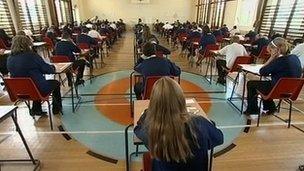End culture of 11-plus test coaching, grammars urged
- Published

Children sitting the 11-plus exam in Kent
The culture of coaching pupils for 11-plus exams must be ended so poor bright children are not excluded from grammar schools, an educational charity says.
The Sutton Trust says grammar school entrance tests should also be changed regularly so they are tutor-proof.
It urges grammar schools to offer test preparation classes to all candidates, so there is a "more level playing field" between rich and poor pupils.
The government gives extra money to schools with disadvantaged pupils.
The report, Poor Grammar: Entry into Grammar Schools for Disadvantaged Pupils in England, says pupils from very low income families are outnumbered by four to one in grammar schools by children from fee-paying prep schools.
It found only 2.7% of grammar school entrants were from families who qualified for free school meals, while 12.7% came from outside England's state sector - mainly independent schools. Overall in England about 20% of pupils are on free school meals.
'Private tutors'
It is well known that many children from affluent homes are coached for entrance tests, with private tutors offering expensive coaching services particularly in areas where grammar schools are high achieving but few in number.
The report also suggested that many parents were using the private preparatory school route to get their children through grammar school doors.
Those on lower incomes are less likely to be able to afford to pay for tutoring or private education.
Grammars that stand alone, rather than in a wholly selective authority such as Buckinghamshire or Kent, draw pupils from a wide geographical area.
This is also true of London grammars which have wide catchment areas, with sometimes 10 or 11 candidates for every place. The competition for places is very intense and not just based on passing the 11-plus but getting the highest marks.
The report called for these high achieving schools to increase outreach work "significantly".
This could mean such schools encouraging low and middle income households to apply and doing more to dispel the the view that some parents may have of them as "elitist", it said.
It even suggests giving priority to poor, bright pupils who meet certain entrance requirements and are eligible for the pupil premium because their families have been in receipt of certain benefits in the previous few years.
And once tests are reformed, it suggests children should be provided with at least 10 hours free, or subsidised preparation for entrance tests, so applicants from all backgrounds are given an even chance of success.
Sutton Trust chairman Sir Peter Lampl said: "Politicians of all parties have accepted that grammar schools are here to stay, and while their numbers are not growing, the number of pupils admitted to them has risen by a quarter, or 30,000, since 1997 and is likely to continue to grow in the years ahead.
"Some grammar schools are working to improve access, and grammar schools in Northern Ireland have a far better record than English grammar schools."
In his foreword to the report, he said: "The challenge to the sector and for those areas where a selective system prevails is how to ensure that those grammar schools are open to all, and are not simply a preserve of better-off families who can afford private tutors or prep schools fees."
He added: "We need fairer tests and there should be a minimum of 10 hours free or subsidised test preparation for all applicants to provide a more level playing field."
But National Grammar Schools Association chairman Robert McCartney said the fact that three-quarters of England had no grammar school meant that it was not fair to compare national figures on pupils on free school meals.
'Over-coached'
He added that the report makes clear that grammar schools are a good thing and they are not going to go away.
"Clearly since 1997 there have been an additional 30,000 pupils at the 164 grammar schools in England. That really means something like an extra 30 grammar schools with pupils of 1,000 each."
He welcomed the idea that grammar schools provide test preparation classes to all pupils, but said it was impossible to design a written test that was not amenable to coaching.
However, he agreed that many pupils found their way into grammar schools because they had been heavily coached for the tests.
He added: "Grammar school heads report that many pupils have been totally over-coached and begin to struggle further up the school."
He said the reason that this coaching industry had come about was because of the "paucity of grammar school places in England".
The Department for Education did not wish to comment on the report.
- Published25 October 2013
- Published15 October 2013
- Published2 August 2013